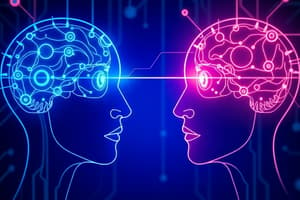Podcast
Questions and Answers
What does the term 'personality' derive from?
What does the term 'personality' derive from?
- Persona, an Italian word for 'character'
- Persona, a Greek word for 'self'
- Persona, a Latin word for 'mask' (correct)
- Persona, a Latin word for 'identity'
Which of the following is NOT a trait associated with personality?
Which of the following is NOT a trait associated with personality?
- Extraversion
- Thoughtfulness
- Shyness
- Height (correct)
What is meant by the term 'mechanisms' in the definition of personality?
What is meant by the term 'mechanisms' in the definition of personality?
- The cognitive processes that affect personality traits (correct)
- The observable actions stemming from personality traits
- The environmental influences on behavior
- The biological factors influencing behavior
Which of the following statements best describes personality traits?
Which of the following statements best describes personality traits?
What does the question 'How are the traits organized?' primarily refer to?
What does the question 'How are the traits organized?' primarily refer to?
Which factor is suggested to influence the origins of personality traits?
Which factor is suggested to influence the origins of personality traits?
What is one possible consequence of personality traits?
What is one possible consequence of personality traits?
Which area is NOT included in the definition of an individual's environment?
Which area is NOT included in the definition of an individual's environment?
What role do personality traits play in understanding behavior?
What role do personality traits play in understanding behavior?
Which component is NOT part of the psychological mechanism?
Which component is NOT part of the psychological mechanism?
How are personality traits described in terms of their consistency?
How are personality traits described in terms of their consistency?
What is true regarding the activation of psychological mechanisms within an individual?
What is true regarding the activation of psychological mechanisms within an individual?
What does it mean when personality traits are described as 'organized'?
What does it mean when personality traits are described as 'organized'?
What does perception refer to in the context of personality and interactions?
What does perception refer to in the context of personality and interactions?
In what way do traits affect social life?
In what way do traits affect social life?
Which of the following describes evocation in personality interactions?
Which of the following describes evocation in personality interactions?
Which statement about personality traits is accurate?
Which statement about personality traits is accurate?
What does adaptive functioning encompass in the study of personality?
What does adaptive functioning encompass in the study of personality?
What might contribute to a person's tolerance for stress?
What might contribute to a person's tolerance for stress?
How does the physical environment interact with personality?
How does the physical environment interact with personality?
What is meant by manipulation in the context of personality?
What is meant by manipulation in the context of personality?
What is the focus of a person's coping strategies according to personality studies?
What is the focus of a person's coping strategies according to personality studies?
Which situation best exemplifies selection in personality interactions?
Which situation best exemplifies selection in personality interactions?
What does intrapsychic refer to in the study of personality?
What does intrapsychic refer to in the study of personality?
What does individual uniqueness signify in personality analysis?
What does individual uniqueness signify in personality analysis?
Which of the following is a characteristic of the nomothetic approach to personality analysis?
Which of the following is a characteristic of the nomothetic approach to personality analysis?
How does the individual and group differences level of personality analysis operate?
How does the individual and group differences level of personality analysis operate?
Which statement best describes human nature in personality analysis?
Which statement best describes human nature in personality analysis?
What is one key distinction between idiographic and nomothetic approaches?
What is one key distinction between idiographic and nomothetic approaches?
Which aspect does the term 'individual differences' refer to?
Which aspect does the term 'individual differences' refer to?
What role does self-esteem play concerning personal goals?
What role does self-esteem play concerning personal goals?
What do 'group differences' in personality analysis examine?
What do 'group differences' in personality analysis examine?
What does the fissure in personality psychology primarily represent?
What does the fissure in personality psychology primarily represent?
Which of the following is true regarding grand theories of personality?
Which of the following is true regarding grand theories of personality?
What is the primary focus of contemporary research in personality?
What is the primary focus of contemporary research in personality?
What is meant by 'domains of knowledge' in personality psychology?
What is meant by 'domains of knowledge' in personality psychology?
Which domain of knowledge primarily addresses individual differences related to traits?
Which domain of knowledge primarily addresses individual differences related to traits?
Which statement about personality psychologists is correct?
Which statement about personality psychologists is correct?
Why is it important to integrate diverse domains of knowledge in personality psychology?
Why is it important to integrate diverse domains of knowledge in personality psychology?
What is an example of a core focus in the Dispositional Domain?
What is an example of a core focus in the Dispositional Domain?
What is the primary interest of the dispositional domain in personality research?
What is the primary interest of the dispositional domain in personality research?
Which domain focuses on the interactions between personality and cultural contexts?
Which domain focuses on the interactions between personality and cultural contexts?
What assumption underlies the biological domain of personality?
What assumption underlies the biological domain of personality?
Which of the following concepts does the intrapsychic domain focus on?
Which of the following concepts does the intrapsychic domain focus on?
Which of the following is a focus of the cognitive-experiential domain?
Which of the following is a focus of the cognitive-experiential domain?
How does the adjustment domain relate to personality?
How does the adjustment domain relate to personality?
Which of the following is NOT a purpose of personality theory in research?
Which of the following is NOT a purpose of personality theory in research?
What is a key focus of the social and cultural domain regarding individual differences?
What is a key focus of the social and cultural domain regarding individual differences?
Flashcards
Personality Traits
Personality Traits
Psychological characteristics that describe individuals and explain their behavior. They help predict future actions.
Psychological Mechanisms
Psychological Mechanisms
Processes that explain personality, including: input (information from the environment), decision rules (how a person thinks), and output (behavior).
Within the Individual
Within the Individual
Personality is consistent over time and different situations. A person's core personality is internal.
Organized Personality
Organized Personality
Signup and view all the flashcards
Relatively Enduring Traits
Relatively Enduring Traits
Signup and view all the flashcards
Talkative people and friends
Talkative people and friends
Signup and view all the flashcards
Personality
Personality
Signup and view all the flashcards
Personality Traits
Personality Traits
Signup and view all the flashcards
Personality Definition Complexity
Personality Definition Complexity
Signup and view all the flashcards
Personality Traits: Number
Personality Traits: Number
Signup and view all the flashcards
Personality Traits: Organization
Personality Traits: Organization
Signup and view all the flashcards
Personality Traits: Origins
Personality Traits: Origins
Signup and view all the flashcards
Personality Traits: Correlations & Consequences
Personality Traits: Correlations & Consequences
Signup and view all the flashcards
Human Nature
Human Nature
Signup and view all the flashcards
Individual Differences
Individual Differences
Signup and view all the flashcards
Group Differences
Group Differences
Signup and view all the flashcards
Individual Uniqueness
Individual Uniqueness
Signup and view all the flashcards
Nomothetic Approach
Nomothetic Approach
Signup and view all the flashcards
Idiographic Approach
Idiographic Approach
Signup and view all the flashcards
Dispositional Domain
Dispositional Domain
Signup and view all the flashcards
Biological Domain
Biological Domain
Signup and view all the flashcards
Intrapsychic Domain
Intrapsychic Domain
Signup and view all the flashcards
Cognitive-Experiential Domain
Cognitive-Experiential Domain
Signup and view all the flashcards
Social and Cultural Domain
Social and Cultural Domain
Signup and view all the flashcards
Adjustment Domain
Adjustment Domain
Signup and view all the flashcards
Personality Theory
Personality Theory
Signup and view all the flashcards
Personality Traits and Mechanisms
Personality Traits and Mechanisms
Signup and view all the flashcards
Interaction with Situations
Interaction with Situations
Signup and view all the flashcards
Perception (in Interactions)
Perception (in Interactions)
Signup and view all the flashcards
Selection (in Interactions)
Selection (in Interactions)
Signup and view all the flashcards
Evocation (in Interactions)
Evocation (in Interactions)
Signup and view all the flashcards
Manipulation (in Interactions)
Manipulation (in Interactions)
Signup and view all the flashcards
Adaptive Functioning
Adaptive Functioning
Signup and view all the flashcards
Physical Environment
Physical Environment
Signup and view all the flashcards
Social Environment
Social Environment
Signup and view all the flashcards
Intrapsychic Environment
Intrapsychic Environment
Signup and view all the flashcards
Grand Theories of Personality
Grand Theories of Personality
Signup and view all the flashcards
Contemporary Research in Personality
Contemporary Research in Personality
Signup and view all the flashcards
Fissure in Personality Psychology
Fissure in Personality Psychology
Signup and view all the flashcards
Domains of Knowledge in Personality
Domains of Knowledge in Personality
Signup and view all the flashcards
Dispositional Domain
Dispositional Domain
Signup and view all the flashcards
Biological Domain
Biological Domain
Signup and view all the flashcards
Intrapsychic Domain
Intrapsychic Domain
Signup and view all the flashcards
Cognitive-Experiential Domain
Cognitive-Experiential Domain
Signup and view all the flashcards
Social and Cultural Domain
Social and Cultural Domain
Signup and view all the flashcards
Adjustment Domain
Adjustment Domain
Signup and view all the flashcards
Study Notes
Introduction to Personality
-
Personality is a pattern of relatively permanent traits and unique characteristics that give both consistency and individuality to a person's behavior.
-
Defining personality is difficult because it's a complex structure.
-
Personality is a set of psychological traits and mechanisms that are organized and relatively enduring and influence a person's interactions with, and adaptations to the environment.
-
Personality traits describe both similarities and differences between people (e.g., shy, talkative, outgoing, extravert, anxious, thoughtful, dominant).
-
Traits describe the average tendencies of a person. For example, a talkative person may have quiet days but, on average, speaks more than others.
-
Research on personality traits asks about the number, organization, origins, correlations, and consequences of traits.
-
Psychological traits are useful because they help describe people and understand the dimensions of differences between people. They help explain behavior and predict future behavior.
-
Psychological mechanisms are like traits, but more focused on the process of personality. They have three essential components: input, decision rules, and outputs.
-
Input is information from the environment.
-
Decision rules specify how an individual should think about the information.
-
Outputs influence how people behave.
-
"Within the individual" means that personality is consistent across time and different situations.
-
Personality traits and mechanisms are typically organized, and not random collections of elements.
-
Traits are relatively enduring, especially in adulthood, and somewhat consistent across situations. For example, an anger-prone person tends to be angry in various situations.
-
Personality traits and mechanisms influence people's lives by shaping how they act, view themselves, think about the world, interact with others, and feel.
-
Personality plays a crucial role in shaping people's lives.
-
Interactions include perception (how people interpret the environment), selection (how people choose situations), evocation (reactions others have to a person), and manipulation.
-
People vary in how they perceive the environment.
-
Individuals choose situations they enter.
-
Some actions evoke reactions from others. The goal is often unintentional. For example, a hyperactive child may evoke attempts to restrain the child.
-
Manipulation occurs when people intentionally influence others' behavior, thoughts, and feelings. For example, an orderly person pushes others to follow the rules.
-
Adaptation concerns adaptive functioning, such as accomplishing goals, coping, adjusting to challenges/problems in life. For example, people who worry a lot often get support from others.
-
The physical environment poses challenges.
-
Social and intrapsychic environments are also vital.
-
Examples of environmental threats include heights, snakes, spiders, and strangers.
-
The ways people cope with the social environment—belongingness, love, and esteem—are critical in understanding personality.
-
Intrapsychic means 'within the mind' that includes memories, dreams, desires, fantasies, and experiences.
-
Self-esteem depends on how well we are achieving our goals.
Levels of Personality Analysis
-
Personality can be analyzed at three levels: human nature, individual and group differences, and individual uniqueness.
-
Human Nature: Traits and mechanisms of personality that are common to nearly everyone (e.g., need to belong, capacity for love, spoken language).
-
Individual and Group Differences: Ways in which people vary from one another (e.g., extraverts, sensation seekers, variation in the need to belong). This also includes group differences, such as cultural, age, gender, and socioeconomic differences.
-
Individual Uniqueness: Personal and unique qualities that aren't shared by others (e.g., individual personalities of Letisha, and Santino in expressing love and aggression).
-
Individuals can be studied nomothetically (finding general laws of behavior applicable to everyone), or idiographically (in-depth study of individual cases like through case studies).
A Fissure in the Field
- Personality theory (human nature level of analysis) and contemporary research (individual and group differences).
- Grand theories attempt to explain universal human psychological processes. (Sigmund Freud's work is an example).
- Contemporary research focuses on how individuals and groups differ, not human universals. Researchers might be focused on one particular area of personality.
Domains of Knowledge
- A domain of knowledge is a specific topic or area of study.
- Six domains: Dispositional, Biological, Intrapsychic, Cognitive-Experiential, Social and Cultural, Adjustment.
Dispositional Domain
- Deals with ways individuals differ
- Aims to identify/measure traits defining individual differences like habitual emotions
Biological Domain
- Assumes biological systems (nervous system, brain) shape behavior, thought, and emotion
- Example research: twin/adoption studies, psychophysiology
Intrapsychic Domain
- Focuses on mental mechanisms, often outside of conscious awareness
- Example: Freud's psychoanalysis
Cognitive-Experiential Domain
- Focuses on conscious thoughts, feelings, desires, beliefs about self/others
- Includes self-concept, goals, emotional experiences
Social and Cultural Domain
- Emphasizes the impact of cultural/social contexts on personality
- Examines variations in social norms (aggression, gender roles)
Adjustment Domain
- Addresses how personality influences how people cope, adapt, and adjusts to daily events/challenges
- Includes health outcomes, coping responses, problems in daily living
Evaluation of personality theories
- Five scientific standards:
- Comprehensiveness (explains most facts)
- Heuristic value (guides future discoveries)
- Testability (makes precise testable predictions)
- Parsimony (has few premises/assumptions)
- Compatibility and integration (consistent with other knowledge domains)
Studying That Suits You
Use AI to generate personalized quizzes and flashcards to suit your learning preferences.




